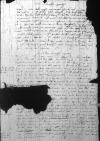Gestrigs tags / noch abzcoge der edlen(n), wolgeborn(en) h(e)rn ⌊elbingschn(n) und danczker castellan⌋ und E(wer) H(erlichkei)t ⌊sones⌋, marienburgscher(r) underkemerer(r), / ist ein ko(nigliche)r kemerer(r) an uns gelanget, / welcher(r) uns ⌊ko(nigliche)r m(ajeste)t⌋, u(nsers) a(llergnedigsten) h(e)rn briff, an die h(e)rn rethe disser land vorczeichent on the margin⌈an die h(e)rn ⌊rethe disser land⌋ vorczeichentan die h(e)rn rethe disser land vorczeichent on the margin⌉, / des copeie hie eingeslossen, / hoth uberantwurt. / Weil das dazumhal hie noch gewesen sindt / der hochwirdig(e) her(r) ⌊bischoff zu Colmen(n)⌋ und der ⌊ersamen(n) von(n) Thorn(n)⌋ geschickter(r), / sein wir / zu uns die ersamen(n) hie des rats furderende / zusamne gekomen(n), / uns disser sachen noch inhalth koniglichs briffs, / undreinander [...] paper damaged⌈[...][...] paper damaged⌉ nichts fuglicher mocht finden(n), / dan das wir hochgemelter ko(nigliche)r majestet paper damaged⌈[majestet]majestet paper damaged⌉ [...] paper damaged⌈[...][...] paper damaged⌉ [...] paper damaged⌈[...][...] paper damaged⌉bn(n), / wie oben(n) gemelt, / und das wir [...] paper damaged⌈[...][...] paper damaged⌉en davon / andren(n) stenden das rots disser [...] paper damaged⌈[...][...] paper damaged⌉ [...] paper damaged⌈[...][...] paper damaged⌉nen(n) / was dan(n) in der kurcze durch schreibn(n) [...] paper damaged⌈[...][...] paper damaged⌉ [...] paper damaged⌈[...][...] paper damaged⌉lchen(n) schrifft(en) under uns wurd entslossn(n) [...] paper damaged⌈[...][...] paper damaged⌉ lossen(n) wissen. / Von der sachn(n) in sich [...] paper damaged⌈[...][...] paper damaged⌉ [...] paper damaged⌈[...][...] paper damaged⌉n(n) hie hab wir nichts anders nuczlicher(r) bedocht / [...] paper damaged⌈[...][...] paper damaged⌉ vorschob und erstreckung der zceit biss uff negst kunff paper damaged⌈[unff]unff paper damaged⌉tige ⌊tagfart⌋ wurd von ko(nigliche)r m(ajeste)t on the margin⌈von ⌊ko(nigliche)r m(ajeste)t⌋von ko(nigliche)r m(ajeste)t on the margin⌉ gebet(en), / mit vorbehalt, was sonst ein(n)m(m) overwritten⌈m(m)m(m) overwritten⌉ idern(n) zu dissem(m) handel das beste wurd bedunck(en), das wir das schrifftlich einer dem andrenn superinscribed in place of crossed-out under einander⌈under einander einer dem andren(n) einer dem andrenn superinscribed in place of crossed-out under einander⌉ lissen(n) wissen(n). / Solchs so an uns wurd komen(n), / wolde wir mit den(n) ⌊hochwirdig(en) h(e)rn zu Colem⌋ under uns wol einnemen(n) und des meist(en) teils stym zum antwurt an(n) ⌊ko(nigliche)r m(ajeste)t⌋ zufertig(en). / Derweg(en) was hirinne E(wer) H(erlichkei)t wolde superinscribed in place of crossed-out wort⌈wort wolde wolde superinscribed in place of crossed-out wort⌉ uns [m]it den erst(en) [...]en(n) willen und votum on the margin⌈m hidden by binding⌈[m]m hidden by binding⌉it den erst(en) [...] hidden by binding⌈[...][...] hidden by binding⌉en(n) willen und votum[m]it den erst(en) [...]en(n) willen und votum on the margin⌉ wissen(n) lossen(n). / Die wir hiemit in langwerig(er) gesuntheit gotlichn(n) gnad(en) befeln(n).

 AAWO, AB, D. 7, f. 44r (b.p.)
AAWO, AB, D. 7, f. 44r (b.p.)